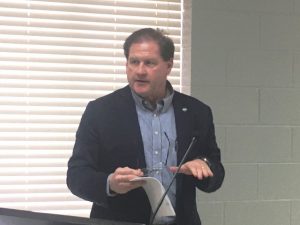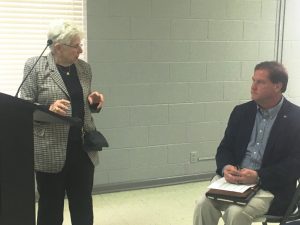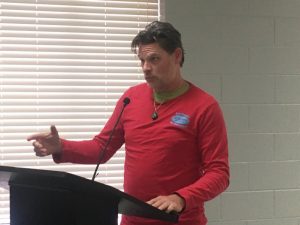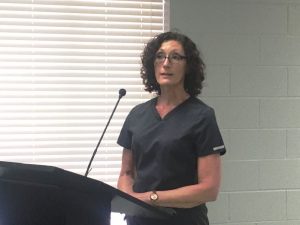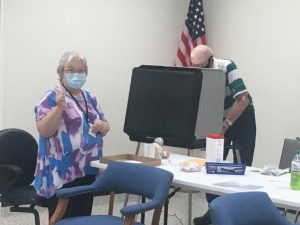News
Should city pursue grant for transitional substance abuse recovery home for women (view video here)
April 11, 2022
By: Dwayne Page
Should the City of Smithville seek a grant to fund a new transitional home for women in recovery from substance abuse?
The mayor and alderman may make a decision on that during a special called meeting Thursday, April 21 following a budget workshop at 5:30 p.m. at city hall.
Mark Farley, executive director of the Upper Cumberland Development District and the Upper Cumberland Human Resource Agency, says the city could be eligible for a community development block grant of up to $750,000 for such a program without any local grant match or costs to the city but the deadline to apply is April 29. Contract terms between the city and UCDD/UCHRA, the partnering agencies, as to how the program would be operated could be worked out after the grant application has been filed. The city could still turn down the grant if the mayor and aldermen change their minds or can’t come to terms with the partnering agencies.
Farley made the mayor and aldermen aware of this grant opportunity in March and came back to answer questions during a public hearing last Monday night at city hall.
According to Farley, the state will probably only award two or three of these grants this year and Smithville is a good candidate to get one based on statistics that show DeKalb County has the highest percentage of fatal and non-fatal overdoses in the state. If approved, Farley said only 8-12 single females or women with children would be served at this transitional home, the location for which has not yet been chosen although three spots have been looked at all within a half mile of city hall. He added that the facility would be similar to the Emmanuel House in Carthage.
Farley explained that the first step in the process is for the mayor and aldermen to adopt a resolution to make application for the grant. As a partnering agency, UCDD would apply for the grant on behalf of the city and UCHRA would administer the program.
“The state has rolled out a new grant this year to fund two to three projects across the state to help create some transitional housing opportunities for those individuals coming out of substance abuse,” said Farley. “They have produced some data to measure how all the communities stack up. Unfortunately, when you look at it per capita according to their statistics, DeKalb County had the highest percentage of fatal and non-fatal overdoses based on your population. In fact, DeKalb County scores the highest in the state of Tennessee,” said Farley.
“Obviously, it makes sense to start with DeKalb County to see if that is something that you would be interested in. What we propose is trying to find property inside Smithville to create a facility that would serve single females or women with children. There is another facility in the Upper Cumberland, the Emmanuel House in Carthage which is very well run. We have looked at it from a model standpoint. It is very structured. The ladies come into the program. When they first start, they are very limited as to where they can go and what access they can have but then as time goes on, they try to become employed and move in to permanent housing. This gives an opportunity for them to have a place where they can go to for up to two years, pay rent, get established, get a track record and hopefully at the end of two years move into one of the standard apartment units or a house for rent somewhere in Smithville or DeKalb County or even outside the county,” Farley said.
During the public hearing, concerned citizen Marsha Darrah asked how this facility would be different from others already operating in Smithville.
“We already have five transitional facilities now which house 36 women. What is the difference in what you are proposing and the housing we already have,” she asked.
“I think we would probably provide something more structured than what they do,” answered Farley.
“The city will have a partnership with us (UCDD/UCHRA) and input on this project, where you may not on the others,” added Luke Eldridge, UCHRA’s Substance Abuse Solutions Housing Program Manager.
City alderman Danny Washer asked what the city’s responsibility would be in such a partnership.
“It would depend upon what type of ownership of the property you would want to maintain,” answered Farley. “Because we (UCDD/UCHRA) are a governmental entity and an instrument of local government, the city can retain ownership of the house and it would be on your property rolls but it would be taken off the tax rolls like any other city owned property and the city would probably be responsible for insurance,” Farley explained. “Or you could let us (UCHRA) take ownership of it and it would stay on the tax rolls, and we would pay the property taxes on it, and we would be responsible for all expenses and if we ever quit operating that facility it would revert back to the city of Smithville and you would be able to dispose of it as you wish. However, it probably does have grant stipulations that require that it (house) be operated for seven years in that manner (transitional housing)” said Farley.
Mayor Josh Miller asked if the facility would have 24/7 supervision.
“Probably not,” answered Farley. “We would have somebody over the house as a house manager but we don’t believe any of these ladies would be a threat to the community. They would be coming out of treatment and on the road to recovery. They just need a place where they can establish a history of renting a place so they can go out into the rental market and rent something,” added Farley.
Asked about whether this facility could become another halfway house, Eldridge said there is a difference between the two types of operations.
“With most halfway houses you don’t have a partnership like this with the city. Halfway houses take people off the street and hope they will abide by rules whereas the person in this program is coming right out of that treatment facility and will have some of the structure, knowledge and understanding of how to stay in recovery. We’re just putting that roof over their head. If we can put them in a house somewhere, they will have better success than someone coming out of recovery and then going back to the street or back to the place they came from where they won’t recover,” said Eldridge.
Alderman Brandon Cox asked, “What if we say we don’t want anybody from outside DeKalb County to be part of this. Is that a restriction that would be applicable?”
“My feeling is you have more than enough people inside DeKalb County to make this work. We are opposed to bringing in anybody from outside the 14 county Upper Cumberland Region but we would have to have a certain number to make it work from a financial standpoint,” replied Farley.
“When I first got on the board (aldermen) we had a meeting about the halfway houses here. Some of the issues from that is that we were getting people from Memphis, Knoxville, Nashville who would fail in these halfway houses and end up in the woods behind the ballpark or other places in town. They were not part of this community and had no place to go but they could not go back (where they came from) because they would violate probation. If we don’t meet capacity, what is the next step? Will there be (admission) restrictions or limitations we can put in place for instance if someone has a felony history or a violent criminal history can we put those type of restrictions on this and is there a board or process for kicking somebody out of the program,” asked Alderman Cox.
“If you want to establish a board we would love that,” said Farley. “At the end of the day the UCDD and UCHRA work for you and you are going to be part of setting the rules and regulations and any oversight of this facility. We are applying for this on behalf of the City of Smithville so this is within your purview to put any type of restrictions or stipulations on it you want. Our job is to work out an agreement with you so that you are satisfied it will be managed in an appropriate way that you are happy with. If the mayor picks up the phone and says I’m not happy with something we will change it,” he said.
Asked where this facility would be located, Farley said three sites are under consideration but he did not want to disclose them publicly.
“We have identified three sites. We have sent a team to look at them and we think they are viable but with the real estate market the way it is I don’t want to reveal them but they are all probably within a half mile of this location (city hall). We will give you (mayor and aldermen) a list of properties we feel are viable. I don’t have a problem with you saying this is the one we want you to go after,” added Farley.
Concerned citizen Bert Driver said he would like for the UCDD/UCHRA to produce the statistics that show a need for this facility and he urged the city to not make a hasty decision and to take time to consider issues such as zoning for the project.
“This a benevolent community that reaches out and supports people in need,” said Driver. “I am very proud of the Upper Cumberland and what the UCHRA is doing and what UCDD does. There is a harmonious relationship here but in my opinion I think the council needs to ask itself what about zoning?. Before we get the proverbial cart ahead of the horse, can you (city) step back a minute even though you may miss the window on this one because this won’t be the last time a proposal will come to you?. Its not a bad program but maybe step back a minute and take time to reflect for the next few months and come up with some ideas about where the zoning is for this type of transitional housing. It kind of caught everybody off guard. Where does it go?. There are really no guidelines for it. Part two is where did these statistics come from?. I would just like to see them. If there is raw data from the UCHRA, were those people in transitional homes? What was their origin? What age were they?. I think there is more data there the community might want to know about that might help answer some of these questions. That is all I would ask. We also have other challenges around this community. Infrastructure is one of them so before you bite off something else maybe step back and reflect on the zoning and what the real statistics are and where those energies can be placed,” said Driver.
Concerned resident Meshia Johnson spoke out in favor of the program.
“We do have a drug problem here in Smithville,” said Johnson. “I want to give you a different perspective. As a parent, I had a child who was in addiction for 10 years and the community really doesn’t treat you with love always when you have a child in addiction. With these girls who are walking our streets from the transitional homes, they are women who have made bad choices. God tells me to give everybody a chance. Yes, we have serious issues and we want to make wise decisions. I know you (mayor and aldermen) will. I have been praying about this for some time now. I know you have a hard decision but people do recover. My daughter recovered and she now works for the state. She tried to kill herself and now she does suicide prevention. So these women can change their lives. Its not that hard to minister to them. I do think that this transitional home they are looking at is a different situation. I ask that you pray about it. We want to help our people who have addition. Some people do recover and these are people who have already gone through some treatment. These are not court ordered. These are people who are really trying. I would ask that you prayerfully consider that and remember that these people have mothers and fathers and somebody loves them if not only God. We can make a difference in their lives by just showing love in a hard time,” said Johnson.
Early Voting Begins Wednesday for May 3 Primaries (View video and sample ballots here)
April 10, 2022
By: Dwayne Page
It’s almost time to vote!
Early voting will be Wednesday, April 13 through Thursday, April 28 at the DeKalb County Courthouse in Smithville with limited hours at the Fairgrounds in Alexandria for the DeKalb County Democratic and Republican Primaries. This is the first time both political parties will be having a local primary to select nominees for the general election.
“Voters are reminded these are primary elections and they can only vote in one of the elections,” said Dennis Stanley Administrator of Elections. “Under state law, a voter cannot vote in two primaries which are held at the same time, such as is the case on May 3rd.”
Stanley encouraged voters to study the ballots and make their decision which primary they wish to vote in before heading to the polls, either for early voting or election day.
Early voting hours in Smithville are as follows: Mondays 1 p.m. to 5 p.m.; Tuesdays 9 a.m. to 1 p.m.; Wednesdays 9 a.m. to 1 p.m.; Thursdays 2 p.m. to 6 p.m.; Fridays 9 a.m. to 1 p.m. and Saturdays 9 a.m. to Noon.
Early voting hours in Alexandria will be Tuesday April 19th from 3 p.m. to 5 p.m. and Monday April 25 from 9 a.m. to 11 a.m.
All properly registered voters can vote early at either location. Early voting will not be held on Good Friday.
Voters are also reminded to keep their address up to date with the election office to avoid delays when they come to vote.
A total of 57 candidates are listed between the two primary ballots with 26 of those seeking the party nomination for the seven county commission districts.
(View sample ballots at links below)
Democrat Primary Sample Ballot
Republican Primary Sample Ballot
(DeKalb County Administrator of Elections Dennis Stanley in conjunction with WJLE has produced a short video with important information of which voters should be aware for the May 3 DeKalb County Democratic and Republican Primaries. Stanley said the purpose of the video is to answer questions that voters may have to better prepare them for election day. The following is a summary of the information shared by Stanley in the vide):
Sample ballots will also be posted on the election commission website at www.dekalbelections.com and will be available at each voting location to assist the voters with their decision.
Democrat Primary Sample Ballot
Republican Primary Sample Ballot
DeKalb Students Test for Black Belt Ranks
April 10, 2022
By: Bill Conger
Three students from Middle Tennessee Tae Kwon Do in Smithville participated in the United States Chung Do Kwan Black Belt Exam at the 2022 National Taekwondo Conference on March 17 in Oviedo, Florida. Jacob Harrell tested for 1st degree black belt. Bane Averitte tested for 2nd degree black while Amy Lloyd tested for 3rd degree black belt. Madison Lack and Ivanny Earlington tested for 1st degree black belt last August in Louisville, KY, bringing to five the number of students who have tested for their black belt ranks the last six months. Master George Lloyd explains that students train from 3 to 5 years to attain a 1st degree black belt.
“Some of our students have overcome personal issues to make it to the black belt testing,” Lloyd says. “We are extremely proud of them all.”
“A black belt represents that you are a champion of his or her weaknesses,” says Lloyd. “Skill and mentality of black belt shows they understand the basics of the martial art and when to and when not to use their skills. As for each strip on the black belt, the skill mentality and understanding of the martial art increases for that student There is a long list of physical and mental activities each student at each rank must perform under stressful conditions. The students train for years to demonstrate their skills and abilities. Each higher black belt rank must perform the lower ranks material and then their new material. It can become a grueling test of stamina.”
“The average black belt testing takes 3 to 6 hours. The list of required material for testing includes a term paper, a training portfolio documenting their training, Basic fundamentals, Advanced fundamentals, One steps, Forms Free sparing, Takedowns, Self-defense, and Weapons self-defense. At the end of it all the students must do 1 minute of push-ups, 60 seconds of sit-ups, and 5 minutes of running.”
Student undergo a pre-testing to determine if they are ready for the formal black belt exam. Each activity gets a number score for an overall possible score of 100. 90 to 100 is an A, 80 to 90 is a B, and 70 to 80 is a C. Lloyd says the average score is a C+ to a B-. Lloyd says all of his students that tested completed their black belt exams above average.
“Our black belt testing requires multiple masters to sit on the testing board and to agree that the students meet the requirements,” Lloyd adds. “We also follow the United States Chung Do Kwon rules for testing, and those rules come from Korea. There are 9 colored belts to black belt, and all the fun training comes after students make black belt. There are 10 black belt ranks and a different set of training objectives for each rank.”
The Tennessee State Championships will be April 30, 9:00 a.m. until 4:00 p.m., at the DeKalb County Community Complex. Competitors are registered from Pennsylvania, Georgia, Kentucky, Alabama, Florida, and Tennessee. The tournament is open for the public to come watch.
« First ‹ Previous 1 694 784 792 793 794795 796 804 894 2461 Next › Last »








